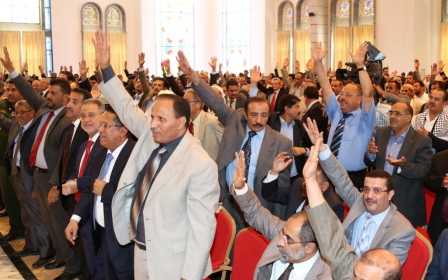Yemen's Houthis to begin third phase of escalation

The leader of Yemen’s rebel Houthi movement called on Thursday issued a rallying cry to his supporters throughout the country.
Abdel Malik al-Houthi, who heads the Ansarullah movement dominated by rebels from the Houthi tribe, called on supporters to shout their slogan from the rooftops of their homes and workplaces across Yemen at 21:00 local time on Thursday (18:00 GMT).
Houthi spokesperson Osama Sari said on his Facebook page that the cry would be part of the “third phase of escalation” for the movement, and would a strong expression of the Houthis’ “rejection of the fuel subsidy cut and of the corrupt government.”
A Saudi newspaper, Okaz, reported on Thursday that Houthis had threatened “military escalation” within the next two days if the government fails to respond fully to its demands.
The report was echoed by a number of Yemeni news sites, but there has been no statement from Houthi officials regarding rumours of a coming military escalation.
The rebels’ planned rallying cry on Thursday night comes after their rejection of an initiative put forward by President Mansour Hadi responding to some of their demands.
Hadi had promised to sack the current government and draw up a new government of national unity within a week, to include representatives from the Houthi movement as well as southern politicians calling for the separation of north and south Yemen.
The initiative would have left Hadi in charge of appointing the heads of “strategic” ministries including interior, defence and foreign affairs.
The rebels rejected the proposal, branding it an attempt to “evade the Yemeni people’s demands.”
Yemen’s new fuel prices came into effect on Thursday, after Hadi decided on 26 August to lower the price of both diesel and petrol, following weeks of protest over the cutting of fuel subsidies.
Long queues of vehicles sprang up outside petrol stations throughout the capital on Thursday morning, according to eye-witnesses who spoke to Yemeni news site Yemen Press.
Thursday’s lowering of fuel prices does not go far enough for the rebels, who are demanding a return of prices to their pre-2011 level, before the popular protests that led to the stepping down of the country's since long-time autocrat Ali Abdullah Saleh in February 2012.
Anti-Houthi march
Meanwhile, hundreds of Yemeni tribesmen marched outside the capital Thursday in protest against the Shiite Houthi rebels, whose latest anti-government campaign is threatening to deepen the impoverished country's political crisis.
Members of the Harith tribe took to the streets on the outskirts of Sanaa, voicing support for Hadi.
The Houthi rebels have threatened to escalate their campaign against the government, which included briefly blocking main arteries in Sanaa on Wednesday.
The tribesmen, shouting pro-government slogans, marched Thursday close to a Houthis encampment near the airport.
"The army and the people are united," they chanted, pledging to protect the capital.
A statement from protesters urged the government to "protect the people... and to spread its authority over the whole country."
Loyalist tribes have closed ranks with troops in fighting the rebels, who have been expanding their control in the north, beyond their stronghold in Saada.
On Thursday, clashes ensued in Jawf province, as Huthis attempted to seize Fardat Nahm, some 40 kilometres (25 miles) northeast of Sanaa, tribal sources said.
Rebels in Jawf want to take control of the main road linking Sanaa with the province of Marib, tribal sources said.
Zaidi fighters have been camped around the capital for the past two weeks and held protests throughout much of August to push for the government's resignation.
Analysts say the rebels are trying to establish themselves as the dominant political force in the northern highlands.
Stay informed with MEE's newsletters
Sign up to get the latest alerts, insights and analysis, starting with Turkey Unpacked
Middle East Eye delivers independent and unrivalled coverage and analysis of the Middle East, North Africa and beyond. To learn more about republishing this content and the associated fees, please fill out this form. More about MEE can be found here.




